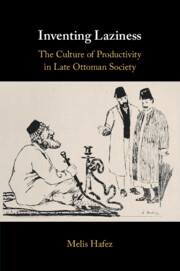Book contents
- Inventing Laziness
- Inventing Laziness
- Copyright page
- Contents
- Figures
- Preface
- Acknowledgments
- A Note on Translations and Transliteration
- Introduction
- 1 Moralizing Productivity in the Age of Reform
- 2 Criminalizing Laziness
- 3 Imagining Ottoman Dandies and Industrious Effendis
- 4 Militarizing the Productive Body
- 5 Exclusionism at Work
- Epilogue
- Bibliography
- Index
1 - Moralizing Productivity in the Age of Reform
Published online by Cambridge University Press: 10 December 2021
- Inventing Laziness
- Inventing Laziness
- Copyright page
- Contents
- Figures
- Preface
- Acknowledgments
- A Note on Translations and Transliteration
- Introduction
- 1 Moralizing Productivity in the Age of Reform
- 2 Criminalizing Laziness
- 3 Imagining Ottoman Dandies and Industrious Effendis
- 4 Militarizing the Productive Body
- 5 Exclusionism at Work
- Epilogue
- Bibliography
- Index
Summary
Chapter 1 examines the moralization of work and stigmatization of laziness in the works of the late nineteenth- and early twentieth-century Ottoman moralists between the first and the second constitutional period (the 1870s to 1908). At the center of this chapter are Ottoman morality texts, a genre, yet to be fully explored, reconfigured in the nineteenth century. These texts articulated many emerging discourses and anxieties of the Ottoman reform period on a normative level. After an overview of the question of laziness in Ottoman thinking, attention is drawn to how a novel kind of knowledge was produced in the field of morality, expressing a new subjectivity in relation to modern citizenship; the normative nature of morality texts and the way these texts moralized, nationalized, and even Islamized productivity is then studied. Ottoman moralists identified certain beliefs and practices as handicaps for productivity and declared them un-Islamic and antithetical to progress. This chapter rethinks the construction of morality and Islamic knowledge in modern times, by examining deontological discourses on work that later produced the neologism of the “Islamic work ethic.”
Keywords
- Type
- Chapter
- Information
- Inventing LazinessThe Culture of Productivity in Late Ottoman Society, pp. 35 - 96Publisher: Cambridge University PressPrint publication year: 2021

